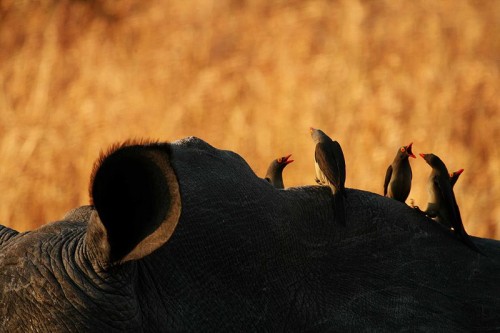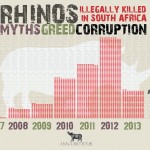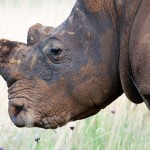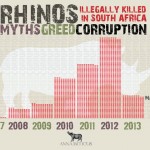
The July 2013 seizure of 24 rhino horns and arrest of 16 suspects in the Czech Republic points yet again to South Africa’s failure to properly monitor its own trophy hunt industry.
The “hunters” were said to have been hired by an “international criminal gang” to legally kill rhinos in South Africa. This is in order to use the CITES permit loophole which allows for the import of “legally” sourced rhino horns into the Czech Republic. Customs officials at Prague’s Václav Havel International Airport became suspicious and contacted the police, according to Radio Prague. Although no names were released due to the ongoing investigation, among those arrested were Czech as well as foreign nationals. The operation was conducted in conjunction with INTERPOL.
South Africa’s trophy hunt industry has been at the center of rhino horn trafficking for quite some time. The first Vietnamese “pseudo-hunt” apparently took place in 2003, and in November 2009, the wildlife trade monitoring network TRAFFIC warned in its report ahead of CITES CoP15 that these bogus hunts had already been taking place on “the same game ranches repeatedly”. Meanwhile, several professional hunters were arrested more than once between 2006 and 2010 for rhino crimes:
- Professional hunter Peter Thormahlen was hit with a “token fine” in 2006 for illegally hunting a rhino (on behalf of a Vietnamese client), before he was brought to court again two years later on identical charges. It is worth noting that Thormahlen’s rhino hunts have frequently taken place on Mauricedale Game Reserve.
- Professional hunter Christaan van Wyk had already been twice convicted of rhino horn offenses when he was found guilty of illegally hunting a rhino (also on behalf of his Vietnamese client) in 2010.
- Prior to the 2011 arrest of professional hunter and game farmer Hugo Ras for unlawful possession of scheduled veterinary drugs and an unlicensed firearm, he had thrice been fined for assault and “crimen injuria” convictions, as well as for contravening conservation and customs laws.
- Suspected syndicate mastermind Dawie Groenewald’s criminal history is remarkably extensive — including a long list of international complaints, lawsuits, and criminal allegations and convictions — and far pre-dates his 2010 rhino-related arrest. Among other things, he was terminated from his job as a police officer for involvement in an organized crime ring that was smuggling stolen cars into Zimbabwe and also has a felony conviction in the US for unlawfully importing a leopard trophy (a violation of the Lacey Act).
Let’s not forget to mention the “Boere Mafia” — an unsavory gang of safari operators, hunters, game farm and lodge owners (allegedly) masterminded by Saaiman Hunting Safaris owner, Gert Saaiman, and Sandhurst Safaris owner, George Fletcher, along with Frans van Deventer. Despite (allegedly) organizing the killing of at least 19 rhinos in national parks and on private game reserves, and facing multiple charges (including racketeering, money laundering, various counts of theft, malicious damage to property and contraventions of the various provincial Conservation Acts and the Aviation Act), they walked free in 2010, when their case was “struck from the roll”.
In August 2012, TRAFFIC published its extensive report (The South Africa – Viet Nam Rhino Horn Trade Nexus), which noted that South Africa’s “high-profile private sector individuals” consistently evade justice.
None of these individuals has yet been convicted and punished, but the outcome of these cases could be pivotal for the future of South Africa’s rhinos. If convicted, and given prison sentences commensurate with what has recently been imposed upon Asian nationals, others in the private sector may be deterred from becoming embroiled in the illegal rhino horn trade trap.
For example, Thai national Chumlong Lemtongthai was sentenced to 40 years in prison for rhino horn trafficking, while his South African accomplice, safari outfitter Marnus Steyl of Steyl Safaris, remains relatively unscathed by the case. The horns were acquired by hiring Thai sex workers to pose as “hunters” on Steyl’s property.
And in July 2013, an investigative report by Fiona MacLeod and Estacio Valoi revealed that South African trophy hunters are operating a rhino horn trafficking ring out of Mozambique. The kingpin is said to be “safari outfitter with a hunting concession close to Corumana dam” who pays bribes to the local police chief to have charges against his operatives dropped.
Other hunters fingered in the investigation since 2011 include a safari outfit previously caught luring lions out of the Kruger for “canned” hunts, and another outfit previously implicated in ivory smuggling in Namibia.
If past performance is any indication, it is highly unlikely that South Africa’s recently-announced “new amendments to the National Environmental Management Act” will have much effect on the situation. Why? Because South Africa almost exclusively blames “foreigners” for its rhino woes, while consistently refusing to convict and imprison its homegrown criminals who use legal trophy hunts to launder rhino horns for the illegal market.



